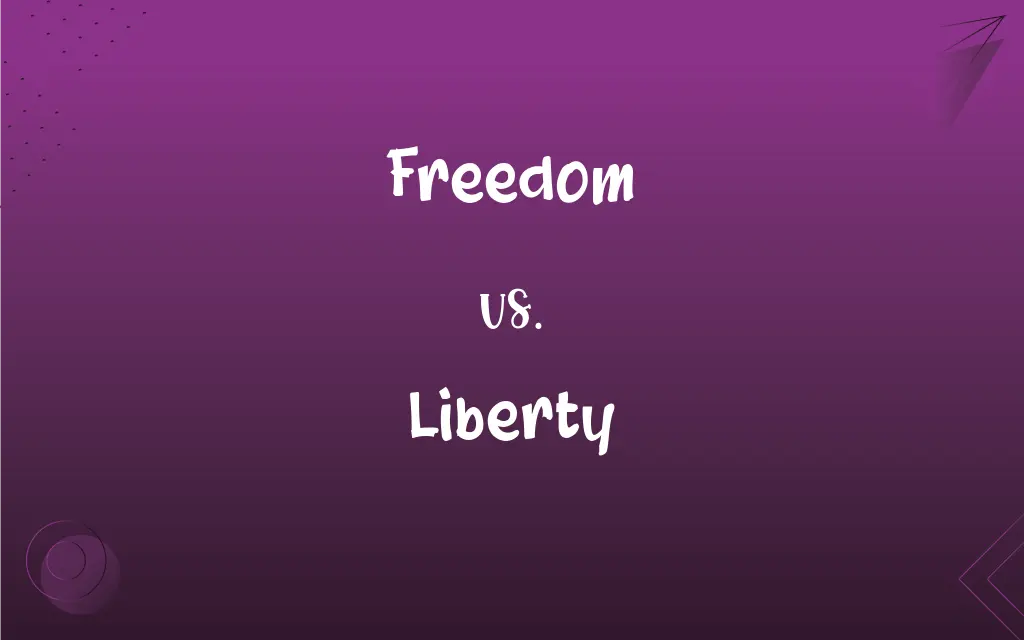Freedom vs. Liberty: What's the Difference?
Edited by Aimie Carlson || By Harlon Moss || Updated on October 13, 2023
Freedom generally implies being free from oppression or coercion, while liberty tends to imply the presence of autonomy and the condition of being free within society from oppressive restrictions.

Key Differences
Freedom is a term that commonly signifies a lack of restraint or coercion. In essence, freedom is often seen as the power to act without hindrance or repression. On the other hand, liberty implies a state of being free within society from oppressive restrictions imposed by authority on one's way of life or behavior. Although both words may seem synonymous, the nuanced differences between them sometimes suggest divergent uses in different contexts or theoretical frameworks.
While freedom represents an absence, denoting a lack of impediments, constraints, or regulations, liberty implies the presence of a condition where one has the right and autonomy to do as one pleases, often within legal or societal confines. Freedom, thus, may be considered more absolute, referring to a state or condition of being free from something specific. Liberty, however, leans towards discussing rights, indicating a more social and collective context where balance and relationship among individuals’ rights are imperative.
Freedom, in many usages, points towards a personal, individualistic aspect. It is often used to discuss personal rights and absence of interference in individual choices, reflecting a more internal or personal condition. Liberty, in contrast, reflects a societal attribute, indicating a state where an entity or individual is granted rights or privileges by a governing body or a set of rules, providing a structured framework within which individuals operate freely.
To illustrate, one might possess the freedom to speak their mind, which is an internal, inherent condition, but the liberty to speak might be restrained by laws or societal norms, reflecting an external, granted condition. Freedom is frequently posed as a more innate, natural condition, while liberty often implies a societal grant or contract. Thus, the conversation around freedom often revolves around inherent human rights, whereas liberty may invite discussions around legislation, governance, and societal consensus.
The intersection of freedom and liberty is substantial, rendering them interchangeably used in various contexts. Freedom, being unrestrained to act, and liberty, having the right to act in certain ways, often merge in common discourse, yet these subtle distinctions are pivotal in philosophical, political, and social debates, wherein the implications of each concept can guide narratives, policies, and societal structures in distinct directions.
ADVERTISEMENT
Comparison Chart
Primary Implication
Absence of restrictions or coercions
Presence of conditions allowing autonomy within societal confines
Individual vs Collective
Tends to emphasize individual, inherent rights
Often involves collective, granted, or legislated rights
Contextual Application
More absolute and can denote a broader, universal condition
Tends to consider societal, legal, or governmental contexts
Intrinsic vs. Granted
Perceived as a natural, inherent state
Seen as a granted condition, often by societal or governmental bodies
Philosophical Usage
Can imply a state devoid of external restraints and interferences
Might imply a structured, granted autonomy within a system
ADVERTISEMENT
Freedom and Liberty Definitions
Freedom
Freedom can imply the absence of subjection to foreign domination or despotic government.
The revolutionaries fought bravely in the pursuit of freedom from the oppressive regime.
Liberty
Liberty refers to the state of being free from oppressive restrictions imposed by authority.
The constitution grants the liberty to practice religion freely.
Freedom
Freedom can refer to the power to determine action without restraint.
Artists often seek the freedom to express themselves without censorship.
Liberty
Liberty may refer to a politically autonomous region.
The territory was declared a liberty under the new jurisdiction.
Freedom
Freedom can also suggest ease or facility in movement or action.
The dancer moved with a freedom and fluidity that mesmerized the audience.
Liberty
Liberty sometimes refers to an unwarranted or impudent freedom to do something.
Taking the liberty to rearrange her desk without permission was seen as presumptuous.
Freedom
Freedom might mean exemption from an unpleasant or onerous condition.
Retirement provided him the freedom from daily grind and work-related stress.
Liberty
Liberty can imply the power to do as one pleases.
The liberty to choose one’s profession is considered fundamental in many societies.
Freedom
Freedom often denotes a state of being free from confinement or physical restraint.
The dog relished its freedom, running wildly across the open field.
Liberty
Liberty can be the physical release from confinement.
After years of incarceration, his first step into liberty was overwhelming.
Freedom
The condition of not being in prison or captivity
Gave the prisoners their freedom.
Liberty
The condition of being free from confinement, servitude, or forced labor.
Freedom
The condition of being free of restraints, especially the ability to act without control or interference by another or by circumstance
In retirement they finally got the freedom to travel.
Liberty
The condition of being free from oppressive restriction or control by a government or other power.
FAQs
Is freedom a universal right?
While many argue it should be, freedom’s definition and extent can vary dramatically between different cultural, social, and political contexts.
Is freedom always a positive concept?
Not necessarily. Unbridled freedom without respect for others' rights and societal norms can lead to chaos and injustice.
Is freedom an absolute concept?
No, freedom is often constrained by laws and societal norms to ensure collective harmony.
Can liberty lead to inequality?
Yes, when liberties are unequally granted or accessible, it can foster social and economic inequalities.
Can one have liberty without freedom?
Generally, liberty implies having the freedom to act within certain confines, making the two concepts intrinsically linked.
Are freedom and liberty synonyms?
They are often used interchangeably but can possess nuanced differences in various contexts.
Is liberty always granted by an authority?
Generally, liberty is understood as being granted or recognized by an authority or system.
Are all freedoms legally protected?
No, legal protections for freedoms can vary widely between different nations and legal systems.
Can liberties be taken away?
Yes, liberties can be restricted or removed, especially in legal or governmental contexts.
Can liberty exist without laws?
Typically, no. Liberty often involves navigating freedoms within structured societal or governmental confines.
Does liberty imply doing anything one wants?
Not exactly. Liberty is often bounded by laws and societal norms to ensure the rights and liberties of all.
Is freedom more intrinsic than liberty?
Often, yes. Freedom is sometimes viewed as a more inherent, absolute concept, while liberty might be seen as granted or structured.
Can one have freedom without liberty?
It’s possible in contexts where one has inherent freedom but lacks the societal or legal structures that denote liberty.
Does everyone have the same freedom?
No, freedoms can be highly variable, depending on one’s social, political, cultural, and geographical context.
Can liberty be absolute?
Rarely. Liberty usually involves navigating freedoms within a structure of laws and societal norms, which by nature imposes certain limits.
Can there be too much freedom?
Yes, excessive freedom without regard for others or societal norms can potentially lead to anarchy and harm.
Does liberty require responsibility?
Typically, yes. Liberty involves navigating one’s freedoms responsibly within societal and legal parameters.
Can liberty be negotiated?
Potentially, yes. Liberties can be discussed, negotiated, and legislatively modified within societal systems.
Can freedom be quantified?
Not precisely. While certain aspects or metrics might be measured, freedom’s overall extent is subjective and context-dependent.
Does freedom include the right to impede others' freedoms?
Generally, no. One person's freedom should not impede or restrict the freedom of others.
About Author
Written by
Harlon MossHarlon is a seasoned quality moderator and accomplished content writer for Difference Wiki. An alumnus of the prestigious University of California, he earned his degree in Computer Science. Leveraging his academic background, Harlon brings a meticulous and informed perspective to his work, ensuring content accuracy and excellence.
Edited by
Aimie CarlsonAimie Carlson, holding a master's degree in English literature, is a fervent English language enthusiast. She lends her writing talents to Difference Wiki, a prominent website that specializes in comparisons, offering readers insightful analyses that both captivate and inform.































































